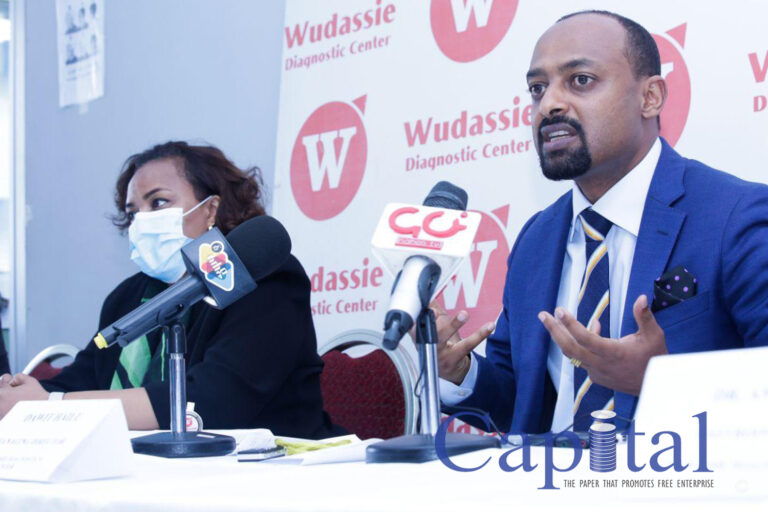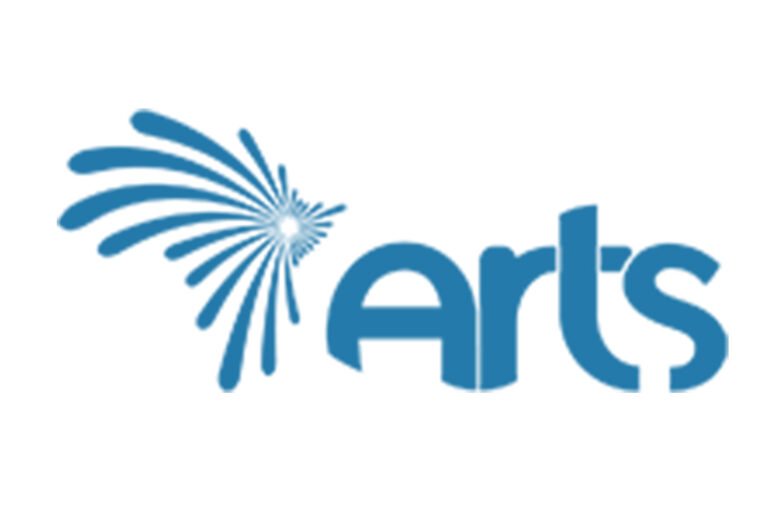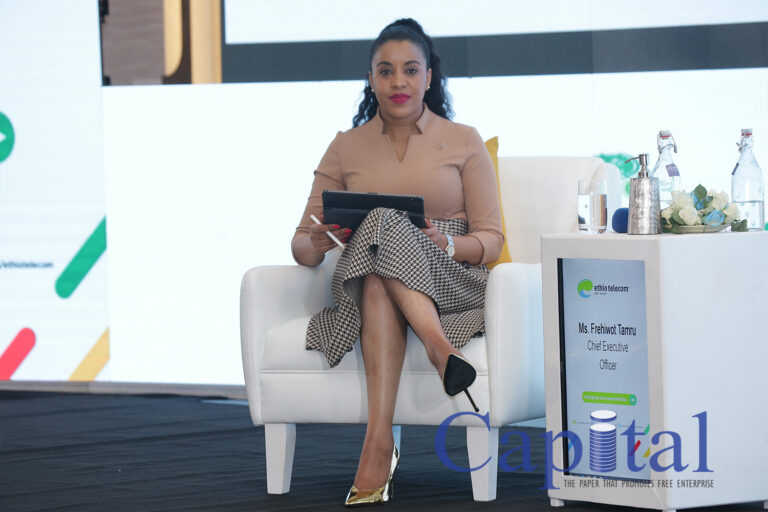Wudassie Diagnostic Center (WDC) has launched the 11th payment free CT scan and diagnosis service for five days for 1000 people who cannot affor it. According to the center the service is said to start on September 6 and will go on until September 10 for five consecutive days.
According to Dawit Hailu General Manager of the center, such program is launched to make its contribution to the needy and to be a model for other private health facilities. “When we play our role, we can also motivate others to contribute on their field,” Dawit said while announcing the initiative.
Wudassie Diagnostic was founded in 2008 and is one of the first diagnostic centers with MRI, CT scan, Digital X-ray, Ultrasound, EKG and Ambulance service in the country.
According to Dawit, WDC is dedicated in providing the community in and outside Addis Ababa with the finest imaging services by a local team of specialized physicians and associates. Beside in helping the needy, Wudassie has been engaged in different community based services including offering free service for 18 local based NGOs.
Wudassie’s free scanning services
Arts TV launches virtual bazar
Arts TV announced the launching of a virtual Bazar in Ethiopia. The virtual Bazaar is organized in partnership with Dashen Bank for the holiday season which is the Ethiopian 2013 New Year festivities.
The Bazar is being held starting from August 26 and will run until the New Year’s eve which will be held on September 10, 2020.
“Bazars were usually held a few weeks before so everyone can purchase foodstuff, presents and other goods for the holyday. This year, the Covid-19 pandemic is making it impossible for such bazars to happen. Arts TV has found a solution for people and companies enabling them to respectively purchase/offer products and services without having to expose themselves and their families to the virus,” reads a statement sent to Capital from Arts TV.
“Arts TV will be producing a two-hour live show every morning for 15 days, with a host who will be presenting partner companies. Consumers will be able to purchase products using their phones and it will be delivered for free to their homes,” the statement further reads.
Payment options are available online and through phones, or at the nearest Dashen Bank branches.
Ethio-Telecom unveils plans to be more competitive
The 126 years old state telecom giant Ethio-Telecom is aggressively working to protect its market share when the country starts opening up the telecom sector in the near future.
Since the government has an intention to open up the telecom industry to private telecom operators and has been receiving bid, Ethio telecom is engaging in new business streams with significant discount, shift in revenue sources, improve the quality of service and accessibility, network expansion and alternative solutions. The telecom provider has also planned to install 5.47 million mobile capacities in Addis Ababa and regions.
The new telecom service providers are expected to get in the country until the end of this fiscal year. This, Ethio Telecom said in its statement, is in line with the Ethiopian government’s direction to reform the Ethiopian telecom market and create a competitive space.
“We are trying to reshape and lead the company with business orientation and competitive mindset with the ultimate aim of making it a preferred operator,” Frehiwot Tamiru, CEO of the sole telecom provider said during a media briefing on August 26. 
Ethio telecom has also developed a three year growth strategy and one year business plan for 2020/21 fiscal year.
To ensure competitiveness and sustainable growth of the company, the strategy has been developed by considering and reviewing relevant government policies, international best practices, and industry trends, Frehiwot said.
“Based on data traffic growth and demand, 4G/LTE Advanced network capacity expansion will be carried out in Addis Ababa and 4G/LTE rollout will be conducted in regional towns. To improve network coverage and capacity, more than 5.47 Million additional Mobile network capacity will be installed in Addis Ababa and Regions. Furthermore, to accommodate growing data usage, International gateway capacity will be upgraded,” Frehiwot added.
Ethio telecom has also planned to increase total subscribers by 13 percent to 51.12 million, Mobile Voice subscribers by 11.8 percent to 49.77 million, Data and Internet users by 16.5 percent to 27.47 million, Fixed Broadband subscribers by 215.3 percent to 669.4 thousand. This is expected to bring telecom penetration to 51.3 percent.
By engaging in new business streams and shifting revenue sources from traditional to value-added services and by offering 14 new and 21 revamped local and international products and services, Ethio Telecom also aims to generate 55.55 billion birr revenue.
Ethio Telecom has also offered several new and revamped services, both local and
international, with significant discounts; such as the Stay Safe package to lessen COVID-19 impacts with up to 59 percent discount. These includes three days thank you gift package, Adey Abeba Package, and Ethiopian new year offer of 100 percent local airtime gift on International Airtime Top-up (IAT).
Ethio-Avaya, My Ethiotel Mobile App, Ethio e-Care, and a new website have been mentioned as ways in which Ethio Telecom strived to create more convenience for its customers.
Africa eradicates wild poliovirus
The independent Africa Regional Certification Commission (ARCC) for Polio Eradication officially declared on Tuesday, August 25, that the World Health Organization (WHO) African Region is free of wild poliovirus.
This marks the eradication of the second virus from the face of the continent since smallpox 40 years ago.
“Today is a historic day for Africa. The African Regional Certification Commission (ARCC) for Polio eradication (ARCC) is pleased to announce that the Region has successfully met the certification criteria for wild polio eradication, with no cases of the wild poliovirus reported in the Region for four years,” said Professor Rose Gana Fomban Leke, ARCC Chairperson.
The ARCC’s decision comes after an exhaustive, decades-long process of documentation and analysis of polio surveillance, immunization and laboratory capacity of the region’s 47 member states, which included conducting field verification visits to each country.
In 1996, African Heads of State committed to eradicate polio during the Thirty-Second Ordinary Session of the Organization of African Unity in Yaoundé, Cameroon. At the time, polio was paralysing an estimated 75,000 children, annually, on the African continent.
In the same year, Nelson Mandela with the support of Rotary International jumpstarted Africa’s commitment to polio eradication with the launch of the Kick Polio Out of Africa campaign. Mandela’s call mobilized African nations and leaders across the continent to step up their efforts to reach every child with polio vaccine.
The last case of wild poliovirus in the region was detected in 2016 in Nigeria. Since 1996, polio eradication efforts have prevented up to 1.8 million children from crippling life-long paralysis and saved approximately 180 000 lives.
The WHO Director General, Dr Tedros Adhanom in his remarks congratulated the government and people of Africa on this historic occassion. “The substantial investments we have all made in defeating polio have delivered a rich reward” he said. He called for continued use of the investments to address other health needs beyond the wild poliovirus eradication from the region. “The end of wild polio in Africa is a great day. But as we all know, it’s not the end of polio” he further said while highlighting that as long as the virus is present in Pakistan and Afghanistan, then it is a global threat. He therefore called upon all present to continue to support resource mobilization to strengthen health systems, train health workers, sustain outreach services and for community mobilization and engagement.
In his address, President Muhammed Buhari reminisced on his pledge on assuming office that he will not bequeath a polio infected country to his successor and expressed his happiness at being able to fulfill that commitment today. He joined the previous speakers to congratulate all the persons who made this possible while appealing for sustained polio surveillance and immunization even after the eradication of the disease from the region. “We must continue to vaccinate our children because vaccines save lives” he remarked. He concluded by assuring the global community that Nigeria will sustain the gains of the GPEI and use the lessons learnt to strengthen its health system.
Rotary members have played an invaluable role in the effort to rid the African region of wild polio. Holger Knaack, President of Rotary International said that this progress is the result of a decades-long effort across the 47 countries of the African region. “It has involved millions of health workers traveling by foot, boat, bike and bus, innovative strategies to vaccinate children amid conflict and insecurity, and a huge disease surveillance network to test cases of paralysis and check sewage for the virus,” the president said.
“Over the last two decades, countless Rotary members in countries across the African region and around the world have worked together to raise funds, immunize children, advocate with local and national leaders, and raise awareness about the importance of vaccination, enabling the Global Polio Eradication Initiative (GPEI) to effectively respond to and stop polio outbreaks,” the president added.
He also called on Rotarians to finish the fight to eradicate polio from the face of the earth. “We are calling on you today to recommit yourselves to ending polio. We need each and every one of you to help finish this fight and continue raising $50 million each year for PolioPlus. The eradication of wild polio in the African region shows us that polio eradication is achievable, and shows how our hard work, partnerships and financial commitment continue to propel us forward, even during a global pandemic.”
“This is a momentous milestone for Africa. Now future generations of African children can live free of wild polio,” said Dr Matshidiso Moeti, WHO Regional Director for Africa. “This historic achievement was only possible thanks to the leadership and commitment of governments, communities, global polio eradication partners and philanthropists. I pay special tribute to the frontline health workers and vaccinators, some of whom lost their lives, for this noble cause.”
“However, we must stay vigilant and keep up vaccination rates to avert a resurgence of the wild poliovirus and address the continued threat of the vaccine-derived polio,” said Dr Moeti.
While the eradication of wild poliovirus from the WHO African Region is a major achievement, 16 countries in the region are currently experiencing cVDPV2 outbreaks, which can occur in under-immunized communities.
“Africa has demonstrated that despite weak health systems, significant logistical and operational challenges across the continent, African countries have collaborated very effectively in eradicating wild polio virus,” said Dr Pascal Mkanda, Coordinator of WHO Polio Eradication Programme in the African Region.
“With the innovations and expertise that the polio programme has established, I am confident that we can sustain the gains, post-certification, and eliminate cVDPV2,” added Dr Mkanda.
“The expertise gained from polio eradication will continue to assist the African region in tackling COVID-19 and other health problems that have plagued the continent for so many years and ultimately move the continent toward universal health coverage. This will be the true legacy of polio eradication in Africa,” said Dr Moeti.





